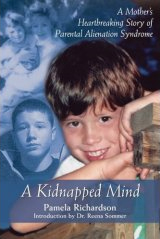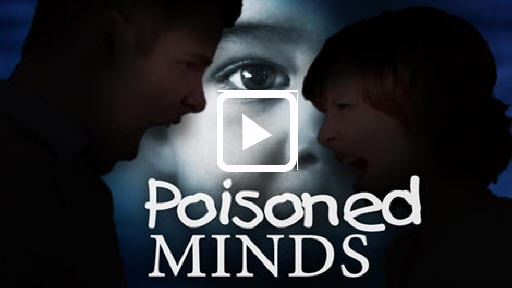![]()
Custody judges rule on vengeance
Courts criticized for recognizing 'parental alienation'
National Post, ( Canada's 2nd largest national daily newspaper), by Kathryn Blaze Carlson, Friday, March 27, 2009
Toronto -- The scope of the courts' reach into family affairs has long been contentious, but a recent trend in Canada's legal system has brought a new controversy that has some onlookers praising judges and others condemning them for accepting what they call "voodoo science."
More than ever before, Canada's judges are recognizing that some children of divorced and warring parents are not simply living an unfortunate predicament, but rather are victims of child abuse and suffering from Parental Alienation Syndrome.
Though debate swirls as to whether the occurrence should be termed a syndrome, a disorder, or simply 'parental alienation,' Canadian and American judges, lawyers, and psychologists are increasingly buying into a view that sees programming a child to despise a non-custodial parent as grounds for removing the "brainwashed" child from the alienating parent's custody - or what is known in the extreme as a court-ordered "parentectomy."
Yesterday in Toronto, roughly 200 of those lawyers, parents and psychologists kicked off Canada's first international conference on this lesser-known subject, a concept developed by psychiatrist Dr. Richard Gardner in 1985 but which is increasingly catching the attention of a broader audience.
High-profile and extreme cases in Ontario and British Columbia, as well as that of celebrity actor Alec Baldwin, have sparked debate over whether it is appropriate for courts to accept these extreme views of parental-custody disputes, or are harmfully overstepping their bounds.
During the past two months alone, an Ontario Superior Court judge and a British Columbia Supreme Court judge ruled in both cases that the parent who embarked on a "campaign of vengefulness" toward the other parent must relinquish any custodial or visitation rights of his or her child for at least a period of about one year.
In the British Columbia case, which wrapped up last week, Justice Donna Martinson ruled that the mother had been "resourceful, highly manipulative, and untruthful" and upheld the court's previous decision to grant sole custody to the targeted father. According to court documents, the mother "undermined" the child's relationship with her therapist, breached an earlier court order by sneaking inappropriate messages to the child through a birthday card, taunted the child with pictures of the dog she left behind upon moving in with her father, and accused the father of abuse - as many alienating parents do.
And in the Ontario case, the judge recommended the targeted parent and his daughter attend a controversial four-day Dallas-based Family Workshop in Parental Alienation that some opponents liken to a "deprogramming" centre.
Though these cases garnered headlines, praise and backlash alike, they are but a small and extreme sample of a wider trend that sees the targeted parent acquire at least some modicum of interim custody. Between 1987 and January 31, 2009, there have been roughly 74 cases in which Canada's courts acknowledged parental alienation in its decision, according to research presented at the conference by Gene Colman, a Toronto lawyer.
Significantly, 53 of those cases occurred in the past eight years and 28 of them occurred in Ontario. Out of the total 74 cases, the mother was determined to be the alienator about two-thirds of the time.
While many agree that parental alienation is a sad phenomenon, tension arises over whether children should be plucked from their homes and planted into the custody of the very parent they have been conditioned to despise or even fear. Some go so far as to criticize the system for what they consider to be "Orwellian interference."
One blogger on a divorce custody Web site wrote that the children involved in Canada's recent cases are "being psychologically tortured, kidnapped" and dismissed the alleged parental alienation as "fictitious." Another blogger responded in kind, also citing "torture."
But to one Ontario father at the conference, parental alienation is anything but fictitious - he says it is to blame for depriving him of time with his three daughters and the "get-up-and-go" to find a job since being let go in 2002. He asked not to be identified as the case is now before the courts.
"I was kicked out of the house in 2003, and my visitation with the girls became sporadic since then," he said, adding that his ex-wife has repeatedly violated visitation orders. "Their mother just slowly started taking them away from me, a little bit more then a little bit more and then a little bit more to the point where I haven't seen my eldest daughter since June 2006."
He said he is sure his youngest daughter misses him, from her reactions the few times he has been allowed to see her. "She'll run up to me and just wrap her arms around me. But when I hug the oldest one, it's like hugging a totem pole - she's just not even there. I feel like I've lost her." Though he hopes to gain custody of his daughters, he said he would never retaliate by depriving his children of contact with their mother.
Indeed, some believe a swift transfer of a child from one parent to another carries its own set of problems, which include the trauma associated with broken attachments, trust issues, as well as low self-esteem and depression.
But Richard Warshak, a Dallas psychologist who runs the Family Workshop in Parental Alienation and author of the popular book Divorce Poison, said while children suffering from "toxic parenting" may at first resist change, their stunned protest quickly dissolves and they are often grateful for the intervention.
"Anyone who has worked with divorcing families have seen angry parents lose sight of what's best for their child," he said. "People don't want to stick their heads in the sand anyRead More ..They are increasingly recognizing the damage and that sometimes children need adults to protect them and manage this."
Those who recognize parental alienation as a legitimate concern insist that damage includes depression, suffering adversely in future relationships, and feelings of abandonment, guilt, and unworthiness.
Toronto lawyer Brian Ludmer, who is trying to launch a family re-unification workshop in Canada, said while it is sometimes difficult to overcome the 'he-said, she-said' factor in such cases, third-party witness statements and interviews with the child are important in solidifying a case against an alienator.
"It is important that everyone work together to properly determine whether the parent is a good trustee of that child's relationship with the other parent," said Mr. Ludmer, who is speaking at the conference today.
He was quick to add that care should be taken to ensure the interview does not make a child feel pitted against either parent which is, ironically, the very stress the court process is attempting to mitigate. Likewise, Mr. Ludmer and others at the conference said professionals should be careful not to over-diagnose or exaggerate parental alienation - one psychologist at the convention said he has been pressured by lawyers to "use the language of parental alienation syndrome" in his custody assessments.
This raises another set of red flags among those who fear that parental alienation cases may result in a child being transferred to the custody of an abusive parent, essentially undermining the custodial parent's right to protect the child and justifiably refuse contact.
But Dr. Demosthenes Lorandos, a psychologist and lawyer who will speak at the conference Saturday, said these concerns are, for the most part, unfounded.
"The idea that parental alienation is a scheme to allow abusers to get custody of children is a baseless pot-shot by people who have either had their children taken away because of abuse or who don't have a real sense or knowledge of what's going on," said Dr. Lorandos. "This isn't some sort of Machiavellian scam. This abuse is happening, and that's the bottom line."

TV Show about Parental Alienation
W5 investigates: Children on the frontlines of divorce
November 7, 2009
The world of divorce is scary for any child. But when a divorce becomes especially toxic, children can become the target of an unrelenting crusade by one parent to destroy the child's relationship with the other. Experts call it parental alienation.

A Kidnapped Mind
What does Parental Alienation Syndrome mean? In my case, it meant losing a child. When Dash was 4 1/2 years old his father and I broke up. I dealt with the death of our marriage and moved on but Peter stayed angry, eventually turning it toward his own house, teaching our son, day by day, bit by bit, to reject me. Parental Alienation Syndrome typically means one parent's pathological hatred, the other's passivity and a child used as a weapon of war. When Dash's wonderful raw materials were taken and shaken and melted down, he was recast as a foot soldier in a war against me.
Divorced Parents Move, and Custody Gets Trickier
The New York Times, New York city, U.S.A. August 8, 2004
Not too long ago, Jacqueline Scott Sheid was a pretty typical Upper East Side mother. Divorced and with a young daughter, she had quickly remarried, borne a son, and interrupted her career to stay home with the children while her husband, Xavier Sheid, worked on Wall Street.
Early last year, Mr. Sheid lost his job and saw his only career opportunity in California. But Ms. Sheid's ex-husband, who shares joint legal custody of their daughter, refused to allow the girl to move away. So Ms. Sheid has spent much of the last year using JetBlue to shuttle between her son and husband on the West Coast and her daughter (and ex) on the East.
The New York court system, which she hoped would help her family to resolve the problem, has cost her tens of thousands of dollars in fees for court-appointed experts, she said, and has helped to prolong the process by objecting to her choice of lawyers.

Judge rules father brainwashed son into hating mother
Globe and Mail
May 15, 2008
Toronto - A 13-year-old Ontario boy whose domineering father systematically brainwashed him into hating his mother can be flown against his will to a U.S. facility that deprograms children who suffer from parental alienation, an Ontario Superior Court judge has ruled.
Mr. Justice James Turnbull ordered the boy - identified only as LS - into the custody of his mother. He said that the boy urgently needs professional intervention to reverse the father's attempt to poison his mind toward his mother and, in all probability, to women in general.
The View - Parental Alienation - Alec Baldwin and Jill Egizii - Both Genders Can be Victims
Alec Baldwin talks about his experience with parental alienation. Alec ( 3rd from right) was accompanied by Jill Egizii ( 2nd from right) , president of the Parental Alienation Awareness Organisation (PAAO) and Mike McCormick, president of the American Coalition for Fathers and Children (ACFC).

Landmark Ruling Grants Father Custody of Children
PA News (U.K.), July 3, 2004
A key court decision to grant a father custody of his daughters after the mother flouted contact orders for four years was today welcomed by campaigners.
Fathers 4 Justice said that the High Court ruling was a vital victory and called for more judges to take a similar stance when faced with resistant parents.
The comments come after Mrs Justice Bracewell transferred the residence of two young girls to their father because the mother persistently refused him contact, despite court orders. Read More ..

Psychiatric disorder may have led boy to fatally shoot father
Rick James Lohstroh, a doctor at UTMB, was fatally shot this summer, apparently by his 10-year-old son.
ABC13 Eyewitness News, Houston, Texas, U.S.A.
Dec. 29, 2004
The 10-year-old Katy boy accused of murdering his father this summer is now the face of an unofficial psychiatric disorder that may have lead to his father's death.
Some psychiatrists call it Parental Alienation Syndrome and they say that's why the son killed Doctor Rick Lohstroh last summer. The syndrome is basically caused by a bitter parent who poisons a child against the other parent, usually in cases of divorce.

THE CANADIAN BAR ASSOCIATION
L'ASSOCIATION DU BARREAU CANADIEN




